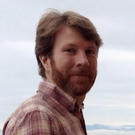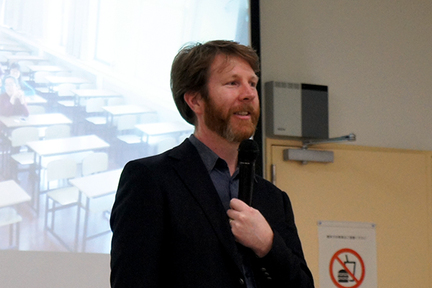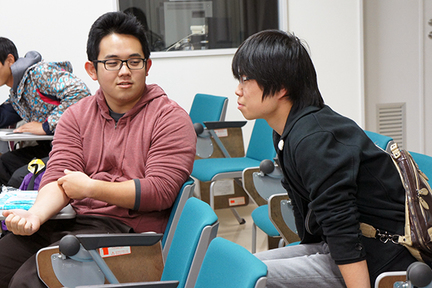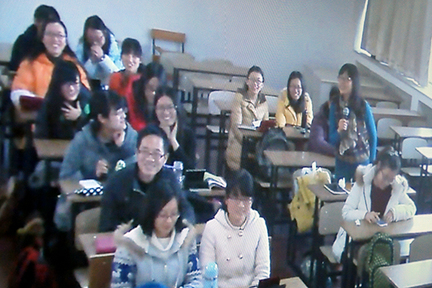I Want to Learn How to Think Beyond Academic Disciplines
Vol.10 2014.12.17 John O'Dea
Body, Mind, World.
These lectures will focus on philosophical problems which arise when we consider the mind and its place in the natural world. 18th-Century French physiologist Pierre Cabanis once asserted that “The brain secretes thought as the liver secretes bile.” In modern times, we are more likely to compare minds to computers. But is this way of thinking really an improvement? How to think about the relation between thought and world is an important theme in the history of philosophy. It connects to issues such as knowledge, religion, science, and what makes us who we are.
The lectures will be divided into four parts. The first part will focus on the problem of colour: are the colours we see around as really just creations of our own minds, or do they have an objective reality? In the second part, we will discuss the problem of illusion: does the fact that we can perceive wrongly mean that we do not directly perceive the world at all, as many have thought? The third part will be a lecture on the mind-body problem: what is the relationship between mind and body? The final part will be on the problem of consciousness: is an objective scientific theory of consciousness possible, or is consciousness only really knowable from a subjective point of view?
- Instructor
-

- John O'Dea
- Associate Professor in the Department of Interdisciplinary Cultural Studies, Graduate School of Arts and Sciences Professor O'Dea earned his Ph.D. in philosophy from Monash University, after studying in the U.S. that followed his B.A. from the University of Queensland, Australia. He has been serving in the current position since 2013, after serving as Project Assistant Professor in the Center for Global Communication Studies. His main area of research is scientific analysis of cognitive experiences. Recent scholarship has attempted to scientifically understand cognitive experiences per se, and scholars are particularly interested in understanding the constancy of cognition. His publications include: “Consciousness and the Problem of other Minds,” “A Proprioceptive Account of the Senses,” and “Transparency and the Unity of Experience.”
comments(最新2件 / 7)
- 2014年12月23日 17:28 reply
今回の授業では哲学という分野の奥深さについて触れることができました。特に「何が信じられて、何が信じられないのか」というテーマでのディスカッションは印象的でした。私はその場で「すべてが疑わしい」という持論をもっていたのですが、その場合「わかることとわからないことの間に意味のある区別が存在しえない」となることが非常に新鮮で興味深かったです。
- 2014年12月23日 23:15 reply
この世界を現実の物だとするために不必要な複雑さは排除すべきだという考え方を提示していたが、それだと有用な情報も複雑だからという理由で排除されてしまうのであまり納得出来なかったが、普段なかなか触れることのない哲学的な話を聞けて良かった。あと、最後に何か排泄に繋がる話を聞いてみたかった。
- 2014年12月23日 23:35 reply
哲学の基本的な議論を英語によるレクチャーを通して再確認することができました。また、そこからの発展的な内容についても知ることができましたが、その場でのディスカッションではすぐに自分の答えが導き出せず、思考力の未熟さを思い知りました。英語によるレクチャーはとても刺激的で良かったと思います。
- 2014年12月24日 00:29 reply
今回は何回かグループワークを行い、他の人の意見を普段の講義より耳にでき、興味深かったです。
現実世界はマトリックスの世界ではない、ということを証明することは、不可能だと思います。しかし、このような諸問題に取り組むにあたり、さまざまな考え方があることを知りました。
- 2015年01月08日 13:00 reply
「不必要な複雑さ」という観点からマトリックスの仮説を否定できそうで、でもこの議論にも様々に反論できるのが、面白かった。
さらに考えを深めてみたいと思った。
- 2015年01月13日 21:37 reply
マトリックスの世界とマトリックスでない世界を「不必要な複雑さ」という点で分けることで、自殺論法を回避し、問題を解決している点が極めて新鮮だった。
Post a Comment
- Other Lessons



今教室にいることがマトリックスの世界で無いということを説明するのに、グループワークでは信じられるものが自分の存在しかないのだから不可能なのでは無いかと考えたのですが、「不必要な複雑さ」といった考え方一つで解決出来てしまうのが新鮮でした。まだまだ哲学的な思考をする頭を持てていないので、読書などを通じて存在や知覚することなどの考え方にもっと触れていきたいと思います。